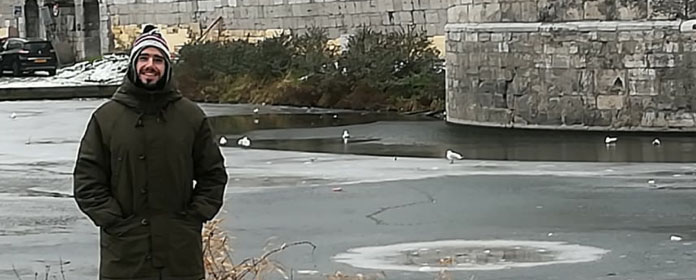News
LATEST NEWS AND EVENTS FROM THE SCHOOL OF ENGINEERING
Research in the Netherlands on how to fight cancer
The former student of the Master in Biomedical Engineering, Oscar Lapuente, narrates his experience as PhD student in Eindhoven.

Oscar Lapuente, former student of the Master's program in Biomedical Engineering, wanted to leave Spain and devote himself to research. He has now spent two years in Eindhoven pursuing a PhD focused on improving the efficacy of immunotherapy against cancer.
Why did you decide to go to the Netherlands?
I had an opportunity there to do the project Master's Thesis, with the possibility of continuing to do a PhD. The topic of project interested me a lot, and after several Skype interviews, we both seemed to be on the same page agreement. Two weeks later I was already in the Netherlands. Obviously, before making the decision, I did some research about the Netherlands, the city, the Technical University of Eindhoven where I was going to go... I also asked for opinions from professors of the master's program. I saw that it was an excellent opportunity, so I went there.
What does your thesis consist of?
Did you know that you can fight cancer with your own body? Just as when one has a cold, in the end we are cured of this cold by the reaction of the immune system. Immunotherapy has result been very effective and achieved surprising results, producing long and lasting responses in patients, but only 20 to 40% of patients manage to benefit from it. And what we want to understand is just this, the heterogeneity that exists among patients. To do this, we are going to develop a model, using statistical learning, to find biological markers that can help distinguish those patients who can respond favorably to treatment, and of course, also try to make the predictions as accurate as possible.
Why did you decide to go into research?
I am restless, curious and always eager to learn. Undoubtedly, that is what led me to choose research. In addition, I really enjoy teaching and although it is a bit far away, I would like to work as a professor at the university. In general, since I started my studies, I have been fascinated by the work our professors do. Now, after almost a year of dedicating myself to research, I still have the same enthusiasm and excitement. I would emphasize that research is a field multidisciplinary that allows you to be in contact with various professionals and that requires you to keep abreast of new changes.
What do you highlight from this experience?
From a professional point of view, I emphasize the ability to analyze problems and propose possible solutions. Working in English, which is a universal language , has enriched me a lot. Also, the contact with people from many countries, either at the University, at conferences or in courses. At the same time, I have had the opportunity to work as a teacher teaching assistant in master's degree courses and Degree. This has helped me to improve my communication skills.
Do you think you were well prepared for the Master's programme?
Of course! At no time have I ever felt that I did not have the right skills to deal with a problem. I believe that everything I learned in the Master, in one way or another, has helped me. First, to get this position at PhD student because of how qualified I was, and second, because of the learning obtained in terms of working in a team, valuing all the members of the team. The human Education received at the School has helped me to face this new challenge in the Netherlands.
What would you highlight from your time at the School?
All the personal relationships I have gained at the School, from fellow students at class to professors. I continue at contact with them because I think the School is a big family. Without going any further, I have coincided in Eindhoven with a colleague from Degree, with whom I did not have much contact, and the same status of being far away from home, has helped us to establish contact and to be friends.
What is your daily life like in the Netherlands?
During the week I love to do sports. I do crossfit and boxing. I'm also learning Dutch and I make a lot of plans with my colleagues. I've been very lucky because both my co-workers and my flatmates are great - and I live in a house with seven people! We go camping, we travel around the country, we go climbing, cycling, to festivals...
